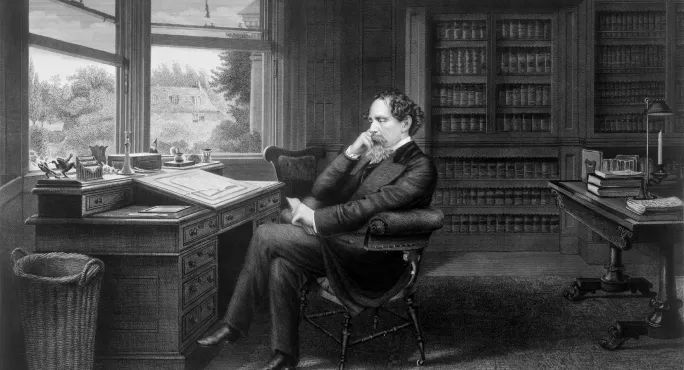- Home
- ‘Adding to students’ vocabulary is about boosting confidence’
‘Adding to students’ vocabulary is about boosting confidence’

A typical Dickens novel, such as Great Expectations, contains over 10,000 unique words. A few years back, it was commonly reported that some teenagers had a working vocabulary of just 800 words, and anyone teaching GCSE English resits will be familiar with the barrier that a lack of confidence with language presents to our learners. On many occasions in the past, I’ve seen students open an exam paper, pull out the reading source, spot a word in the first sentence that they don’t understand, lower their head to the desk and give up.
It’s not realistically possible to expand our learners’ lexicons by the tens of thousands in the curriculum time we’ve got; not alongside honing their analytical skills, sorting out their sentencing, undoing the damage of their previous experience, and everything else that is expected of us in FE for second-rate funding and zero recognition.
But we don’t have to. Julius Caesar, not lacking confidence, wrote his history of the Gallic Wars with a vocabulary of just 800 words. It’s not the vocabulary we need to target. It’s the confidence.
Fear of looking stupid
One thing I try to do regularly is give my students extracts of texts with words either blanked out or replaced with gobbledegook. It’s quite a fun game to see how much of a paragraph you can strip out and it still communicate some meaning. The crucial point is that removing the word removes the initial fear of looking stupid, so they are willing to have a go at making sense of it. It doesn’t take long for them to make the connection that they don’t need to know every word to be able to read for meaning. In the artificial conditions of the exam, they won’t have the luxury of looking a word up in a dictionary or asking Siri, so I suggest they just scribble it out or pretend it’s not there.
The next step is to encourage the students to fill in the blanks themselves. You turn what could have been a daunting reading task into an opportunity for creativity. I did this with an extract from H. P. Lovecraft’s Reanimator and it produced some amusing results. “I stood in the cellar laboratory and gazed at a white, silent figure beneath the dazzling arc-light” became “I stood in the club toilets and gazed at a white, silent figure beneath the dazzling urinal” . For many of our resit students, the realisation that their humour can be an asset can lead to real change in their perception of English.
The object of the exercise obviously isn’t to figure out what the original words were, because that would just be a pointless guessing game. Of course, it’s pleasing when the exceptional students who do have great vocabularies are almost spot on with their word choices, but it’s altogether more wonderful when a student who previously had little confidence makes choices that actually improve the original. Bram Stoker’s description of the brides of Dracula and their “voluptuous lips” is a racy extract with which to engage learners, but became less cringingly sexualised and more sinister in my student’s suggestion of “deathless lips”. It was a memorable high-five-myself moment, because she had picked up the word “deathless” from a “blanking” exercise I had done on a non-fiction article about Adele a few weeks previously.
That Adele article was useful for something else, too. There’s a good chance that our students will face cultural or historical references in the exam reading sources that are decades, if not centuries, beyond their experience. As with the vocabulary, we sadly cannot provide a course on the complete history of the past 218 years. In the exercise, I blanked out the words “Spotify”, “Grammys”, and “Brits”; all things that could easily be unheard of in 20 years’ time, never mind 200 Most students filled the blanks with substitutes such as “Youtube”, their music-streaming service of choice and generic references to “awards”. They understood. They did what confident readers do.
Limited bank of words
The other side of the vocabulary barrier is the limited bank of words pupils themselves are able to deploy in their writing. There’s something we can do for that, too.
One lunchtime in my secondary-teaching days, I was fulfilling my bemused duty of chasing the smokers from one end of the playground to the other. One girl politely refused to stop smoking because “it’s f-ing mellifluous”. I did know her to be a very bright, if underachieving, student, but I enquired where she’d heard that word. Mellifluous, that is.
Power vocabulary. There’s part of me that worries it’s a bit cynical. Instead of aiming to increase your student’s vocabulary by the tens of thousands, you aim to increase it by about ten. Words with unusual spellings that if deployed with confidence in an exam writing task give the impression of an extensive vocabulary. Abhorrent. Jeopardy. Nostalgia…
But that girl took enormous pleasure in telling me her cigarette was “f-ing mellifluous” and she knew precisely what she meant. If we are giving learners confidence to use new words, and to feel smug, proud, or otherwise about it, I think we’re doing our job.
Andrew Otty leads 16-19 English in an FE college. He is an ambassador for education charity Shine.
Keep reading for just £1 per month
You've reached your limit of free articles this month. Subscribe for £1 per month for three months and get:
- Unlimited access to all Tes magazine content
- Exclusive subscriber-only stories
- Award-winning email newsletters



